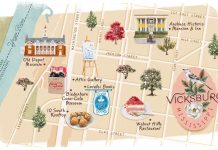
Visit Franklin
Fifteen minutes south of Nashville, deep in the wooded hills, the creative spirit of Music City is distilled to its rustic essence. Leiper’s Fork is barely a wide spot in the road, but this village of wood-framed country cottages lures Nashville royalty with its authentic musical offerings. It isn’t uncommon to find Winona Judd or Justin Timberlake eating fried chicken and playing alongside locals at Open Mic Night at Puckett’s Grocery, and everyone from grocers to Grammy winners shows up at the Lawnchair Theatre for live music and free movies. At Serenite Maison, strum a tune on priceless instruments such as a vintage 1944 Martin B28 guitar or a 1930s Gibson mandolin. (Alas, these instruments are not for sale, though many a would-be buyer has tried.) Leiper’s Fork is also home to more than its share of world-class art, thanks to galleries including Copper Fox, Leiper’s Creek, and David Arms—the eponymous studio of the renowned painter housed in a refurbished barn.
Where to Stay
Moonshine Hill Inn / Situated on twenty-one private wooded acres, this luxurious inn features a pond, vegetable garden, tree house, and its very own music barn honoring the town’s place on the Americana Music Triangle. moonshinehill.com
Where to Play
Lawnchair Theatre / Bring a chair or quilt and enjoy live music or free Friday-night movies all summer at this outdoor theater, complete with a tin-roofed pavilion. visitfranklin.com
Where to Eat
Puckett’s Grocery / Over the last sixty-plus years, this country store has grown into a classic meat-and-three and now operates several locations throughout Tennessee. But this is the original. puckettsofleipersfork.com
Meet the Neighbors
Aubrey Preston
 In 1995, when developer Aubrey Preston returned from Colorado to his home state of Tennessee to raise his family, he discovered Leiper’s Fork. At the time, the burg was little more than a hollowed-out timber town that had long been left to its ghosts. He fell in love with the place, the hills and rural wilderness reminding him of East Tennessee, where he grew up. Preston, fifty-seven, bought up much of the village and encouraged Nashville artists to refurbish and set up shop in some of the abandoned buildings he’d acquired. One of his rules was that every business had to have a front porch, fire pit, or some place where people could congregate, rock in their chairs, and most importantly, play guitar—one of Preston’s passions. “The community takes a lot of pride in letting anyone who wants to play participate,” Preston says. “Music is a way of life here.”
In 1995, when developer Aubrey Preston returned from Colorado to his home state of Tennessee to raise his family, he discovered Leiper’s Fork. At the time, the burg was little more than a hollowed-out timber town that had long been left to its ghosts. He fell in love with the place, the hills and rural wilderness reminding him of East Tennessee, where he grew up. Preston, fifty-seven, bought up much of the village and encouraged Nashville artists to refurbish and set up shop in some of the abandoned buildings he’d acquired. One of his rules was that every business had to have a front porch, fire pit, or some place where people could congregate, rock in their chairs, and most importantly, play guitar—one of Preston’s passions. “The community takes a lot of pride in letting anyone who wants to play participate,” Preston says. “Music is a way of life here.”


















